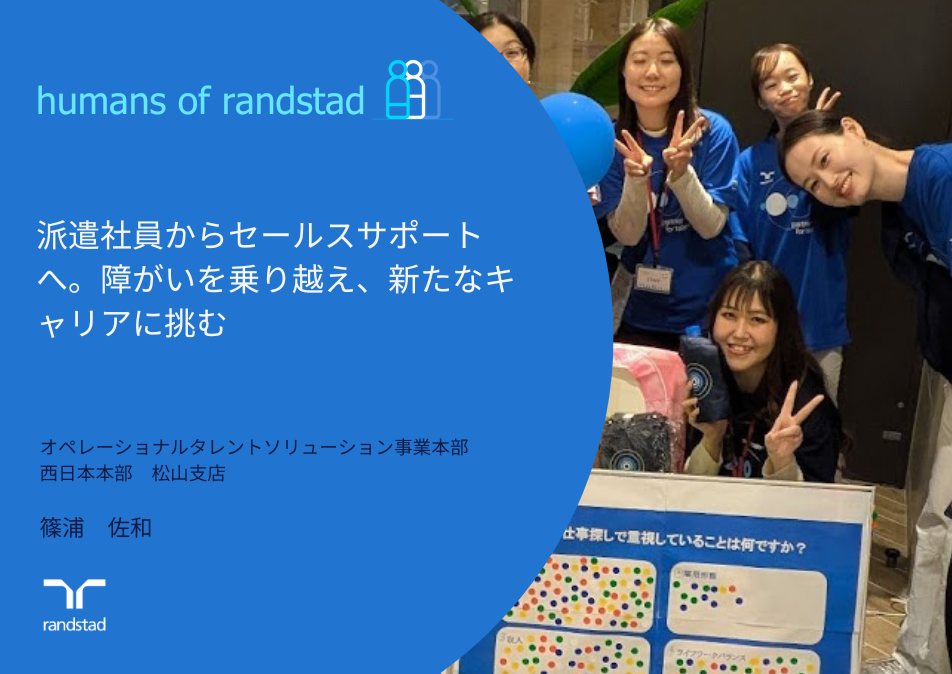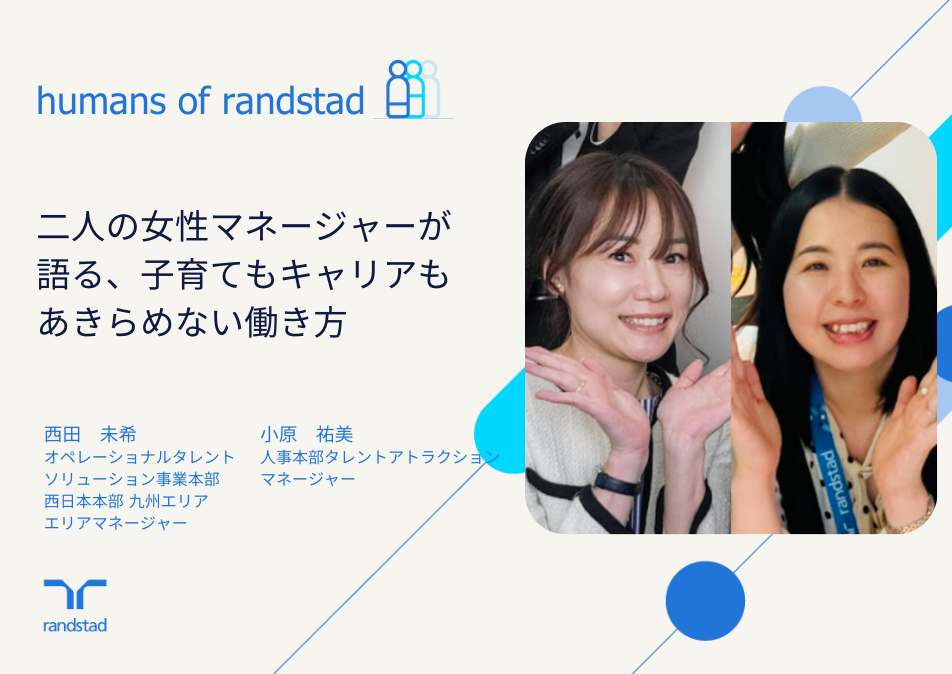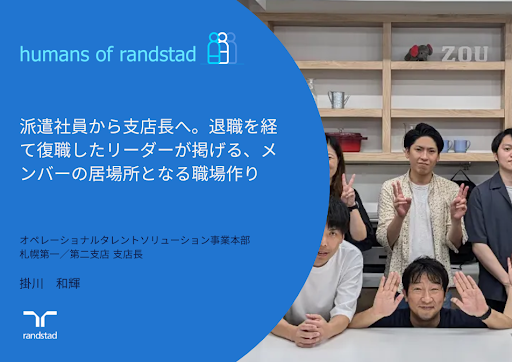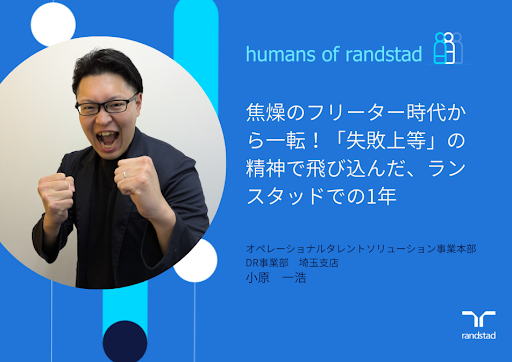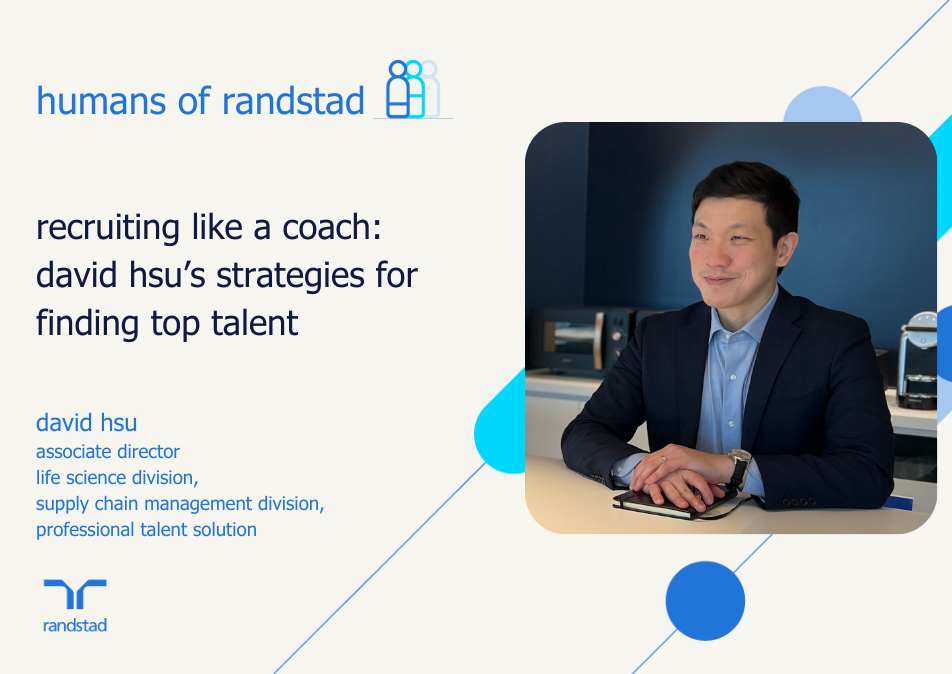interviewFrom tennis player to recruiter: How sports teaches Linfeifei Fan to be gutsy

Linfeifei FanTeam Manager, SCM & Procurement Div.
- profile
- I am from Shanghai, China. I came to Japan to study in high school. While in university, I got interested in recruitment services and have been working in this industry since my graduation. I joined en world Japan in 2016 in order to be part of the Project Contract Specialist department and to be able to utilize my experience and language skills (Mandarin, Japanese, and English) to their fullest potential. I was in charge of Finance and Supply Chain Management two functions at that time. In 2018, I was internally transferred to the Supply Chain Management division to focus on the permanent business. From 2022, I joined Randstad Japan and keep working for SCM industry.
Moving to Japan to play tennis

Linfeifei moved from China to Japan to play tennis.
In the beginning, it was all about tennis. In fact, the first time she ever came to Japan was for an international tournament. She still plays at least once a week and has competed in two tournaments in 2024.
“Tennis teaches me not to give up easily. It makes me a better recruiter,” she says. “It’s also a stress reliever.”
Originally from Shanghai, Linfeifei learned to be independent at a young age, having spent her early school years in a boarding school in Shanghai before traveling across China to participate in tennis programs at the age of 13.
In China, she was raised to believe she only had two options: turning pro or quitting the sport altogether.
Then, she met a tennis player from Waseda University and discovered students in Japan are allowed to juggle sport and study.
She enrolled in a local high school in Chiba Prefecture with a strong tennis team. She could not speak a word of Japanese then, but her parents were supportive of their only child’s decision to start a new life abroad. Teenage Linfeifei was not afraid to dive into the unknown.
“I didn’t know any other Chinese person in my school so I had to learn Japanese quickly. But it wasn’t hard. Speaking isn’t the only way to communicate. I used a lot of gestures,” she says.
She continued her education in Japan after she received a four-year scholarship from Meikai university, where she became the first non-Japanese captain of the tennis team.
Overcoming language barriers was a breeze but getting used to Japan’s strict hierarchical structure was a struggle for Linfeifei, who was fed the message of meritocracy as a child. But in hindsight, she thinks experiencing senpai-kohai relationships in bukatsu (after-school club activity) familiarized her with Japanese business culture and etiquette.
She doesn’t feel like a “foreigner” in Japan because of her Japanese-ness.
“Japan is my second home. I’ve never worked in China and I think I want to stay in Japan,” she says.
She has been in Japan for 16 years and describes herself as trilingual — she speaks Mandarin, English and Japanese.
Finding the perfect fit

Linfeifei landed a sales rep job with a temporary business agency as her first full-time position.
She was busy playing in summer league tournaments when her university classmates were job hunting, so she accepted the first job she was offered.
She turned out to be a good salesperson. Through cold calls and pop-in visits, she learned to embrace risks and rejection. She had to be gutsy to get her foot in the door with new clients and close deals.
After 1 year and 8 months of domestic temporary business services, she had the desire to work in a more international environment. She was searching for roles in consultant when she was drawn to recruiting through serendipity. She found that recruiting was a perfect fit for her “human” skills.
“I chose recruitment because I like connecting people and I like challenges,” she says.
In addition to advertising job openings and screening resumes, recruiters conduct interviews to determine a candidate’s suitability for a specific role. Effective interviews are essential for recruiters to identify the best candidates and make informed hiring decisions.
“To be a good recruiter you need guts. Like any position in any job, you need communication skills. And last but not least, you need listening skills. It takes time to get someone to open up and tell you about their ideal company, desired salary and what they want from an employer.”
Linfeifei spent six years at en world Japan covering supply chain and finance positions, and when she felt she was ready for a new challenge, she looked for a place that would support her professional growth. She joined Randstad in 2022.
Her boss at en world Japan was David Hsu, who is her current reporting line manager.
“There were no surprises because I knew that Randstad’s supply chain team was quite new. I think it started in Dec. 2017. It was good for me because I could use the knowledge and experience I gained at en world to help make the team stronger and bigger,” Linfeifei says.
Linfeifei is 35, an age that can be considered pivotal, both personally and professionally.
The one big difference between her former company and Randstad is that many of her co-workers are younger now because Randstad sees value in hiring and training young talents.. She actually enjoys mentoring younger professionals in her team, who go through an onboarding buddy program if they are new to the world of talent acquisition.
“They’re lucky if Randstad is their first employer because there’s a great support system,” she says.
She also likes being part of a diverse workplace with people that come from different backgrounds, nationalities, cultures, genders and ages.
Linfeifei belongs to the 11-person Supply Chain Management & Procurement team, where she manages two young members — a consultant and an associate consultant.
“We’re a friendly team. Whether you’re a consultant manager or an associate consultant, everyone is treated fairly. We talk freely and have open communication,” she says.
“Supply chain management is a very broad field. I’ve been covering it for more than eight years and personally like the fact the field is so wide and offers so many different opportunities.”
She says her biggest challenge is time management.
Linfeifei works in the office two or three days a week, mainly to communicate with her team and her colleagues, and works from home on the other days. Her weekly routine also includes going to the gym twice a week in the evening and playing tennis on Saturdays.
A firm believer that mental and physical health is key to productivity levels and profitability, she encourages others in her team to exercise regularly.
Talk less and listen more

One of the things she appreciates about Randstad is its transparent working culture. As per company policy, team members can read each other’s email.
“No one can keep a secret. All information is shared,” she says.
She tries to make internal meetings a safe place for members to voice their triumphs and concerns.
Linfeifei thinks being a good listener has helped her in her career. When she meets a potential candidate for the first time, she gives them her full attention and allows them to lead the conversation. She demonstrates genuine interest in their professional development and wellbeing. She prefers face-to-face meetings over online meetings.
She considers it a big win when a client or a candidate comes to her first for any issues.
One of the key elements to a successful recruitment process is the establishment of trust and credibility between recruiters, candidates, and hiring companies.
Communication extends beyond language, but knowing multiple languages does help Linfeifei at times.
“It’s convenient to be able to speak three languages. Many of my candidates are Japanese but I’ve dealt with people from China, Hong Kong, Taiwan, Malaysia and Indonesia, and that’s when I can use my first language.”
Recruiting is both an art and a science. Linfeifei thinks the ability to switch between creative thinking and critical thinking is also important as a recruiter.
“You need to think about how to scout a candidate and what it takes to get him or her to meet a consultant,” she says.
Many recruiters come from areas of business that are totally outside the human resources function, and bring to the job transferable skills that have helped them become successful. One of Linfeifei’s many skills is knowing when to speak and when to stay silent.
She wears a stone bracelet made by her grandmother — gold being a lucky color in China — which is meant to be a good luck charm, but it also serves as an icebreaker when meeting people.
“Some candidates notice my special bracelet and ask me where I got it,” she says. “It’s a natural way to start chatting.”
From good to better to best

Linfeifei has been a recruiter for about 10 years, but she says there is always room for improvement.
She is happy with the training and development opportunities offered by Randstad, including the e-learning tools and online courses, and the guidance and support she gets from David.
Now that she is team manager, Linfeifei has more than just her own performance to worry about. She has two goals: One is to grow her billings, and the other is to see her team members hit their billing goals consistently without her help.
“This was my first year as team manager and I learned a lot from the new grads. I learned how difficult it is to manage people,” she says with a laugh.
“If you can focus only on yourself and your business, it’s easier. Now I have to care about how other people are doing so it’s more work. But I’ve learned so many lessons on leadership.”
Next year she hopes to practice more tough love because she feels that she can be too soft sometimes.

▲2019, travelled Heidelberg, Germany
Business and sport share the same mindset. Through tennis, Linfeifei cultivated various mental and physical skills that propelled her to achieve greatness on the court. It’s time to apply these same principles to her business ventures.
She has always found pleasure in pushing herself to reach new heights.
“I could’ve stayed with my old company for much longer but I wanted to take on a new challenge,” she says.
“I might do this for another 10 years and move to another area or another job. My career feels like a long tournament. Meanwhile, as a short-term goal there is one tennis tournament I want to compete in. I lost in the second round last year but I know I can do better now.”
